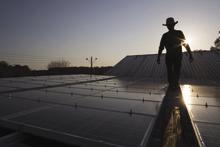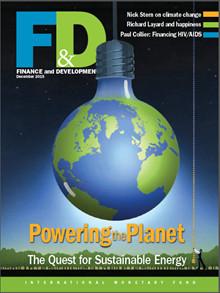
Typical street scene in Santa Ana, El Salvador. (Photo: iStock)
IMF Survey : Combating Climate Change Need Not Thwart Jobs and Growth
November 24, 2015
- Climate change and poverty can be battled simultaneously
- Green jobs are compatible with economic growth
- Now is the time to phase in carbon taxes
As the world gathers in Paris for the UN climate summit, the December 2015 issue of Finance & Development (F&D) magazine explores the tensions—and complementarities—between combating climate change and fighting for growth.

Green energy can be a tool for development; solar panels powering ice machines, Sustainable Development Reserve, Amazonas, Brazil (Stringer/Brazil/Reuters/Corbis)
Powering the Planet
One of society’s most pressing questions is how to balance the demand for sufficient energy to power economic growth and development with the urgent need to sharply reduce carbon emissions, the chief contributor to climate change, notes F&D’s editor-in-chief Jeffrey Hayden. The question fuels intense debate, he says—one that has become increasingly polarized and frequently puts growth and sustainable energy in opposition.
But Nicholas Stern of the London School of Economics (LSE) argues the twin challenges of fighting poverty and climate change are not mutually exclusive. Massive infrastructure investment will be needed in the next 15 years to foster poverty reduction and economic growth in the face of rapid urbanization. But this investment offers an opportunity, says Stern—with international collaboration and deliberate planning—to promote sustainable development, including by reducing the use of fossil fuels.
The ILO’s Peter Poschen and Worldwatch Institute’s Michael Renner say we need not choose between green and jobs. Indeed, protecting the environment can go hand in hand with economic prosperity and job opportunities. ILO and other research concludes that if emissions are cut in line with the goals set for the Paris climate discussions, the result would be net gains of about 0.5 to 2.0 percent of total employment.
In a primer on carbon pricing, IMF economist Ian Parry looks at the practical problems of setting a price for carbon that reflects its true costs. He argues that falling energy prices and positive momentum for action on mitigation after the Paris talks make this the perfect time to phase in carbon taxes.
An analysis of the four major declines in oil prices in the past 30 years by World Bank economists finds the most recent collapse has an eerie similarity to the prolonged slump that began in 1986, which may portend a long period of low prices.
Economists Lucas Davis and Catherine Hausman and IMF researcher Mustafa Jamal round out the magazine’s cover package with stories, respectively, on the future of nuclear power and modernizing electrical grids to allow customer-driven demand-side management.

Financing HIV/AIDS
Paul Collier and coauthors look at the costs of treating and preventing HIV/AIDS in Africa. Now that the disease is controllable, financing treatment and investing in prevention become long-term commitments that could strain some countries’ fiscal capacity. “Donors and governments should not sleepwalk into a future crisis,” warn the authors.
Also in this issue
Luis Catão and Rui Mano examine the high penalty that countries pay when they default on sovereign debt, skewering the common wisdom that the costs of default are minimal. And David Dollar and coauthors debunk the perception that China is a key investor in Africa.
This issue of F&D also includes articles on the effect the increasingly common practice of offering citizenship “for sale” can have on small economies; how a shortage of sand is hampering development; and the negative impact elections have on intelligent decision making about public investment.
F&D’s Back to Basics series explains game theory, and the People in Economics series profiles LSE economist Richard Layard, who says economics has strayed too far from its original purpose—and something he has committed his professional life to: maximizing well-being.


